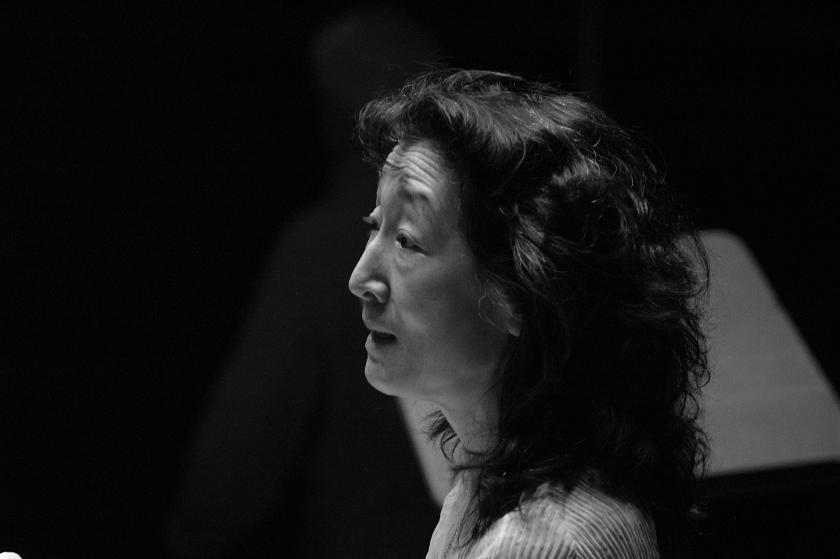Pianist Mitsuko Uchida's concentration, calm and grace under pressure are an inspiration. Towards the end of the first piece on her programme, played to a packed Royal Festival Hall last night, the quiet but insistent high-pitched screech of a fire alarm kept going off. Low voices on walkie-talkies at the entrances to the hall were also audible. Whatever the confusion they were sharing with each other, they were failing to lift it. While the noises persisted, Uchida continued the delicate hand-crossing dialogues of Schubert's F Minor Impromptu from the D935 set. She would quizzically hover a little longer than usual over the occasional cadence, letting her uncertainty speak via the music. She carried on unruffled, finished the piece, then stood up, apologised. "Excuse me, I don't know what to do about this noise."
After about a 20-minute gap, it was ascertained that there had been a false alarm. Uchida came back and played the rest of the programme undisturbed. She first replayed the last four bars of the F Minor Impromptu, and then transported the listener directly, magically into the hushed and other-worldly realm of the A flat Impromptu.
Uchida's unhurried way with Schubert is a known quantity. She constantly gives the music air and space to breathe, tempi are completely flexible and yet always feel as natural as breathing. There was thoughtful programming too, with the short set of variations in the B flat Impromptu providing an adumbration of the Beethoven's vast set of variations to be played in the second half. The fourth Impromptu with its ever-surprising modulations into remote keys brought more urgency, a dazzling più presto, and a wonderful secco ending.
Uchida's performance of the Beethoven Diabelli Variations (left, Beethoven's manuscript of Variation 1, with kind permission of the Beethoven House Museum, Bonn), that sometimes unfathomable masterpiece lasting about an hour, was constantly fascinating. What came through above all, perhaps, was Goethe's maxim that "where there is much light, there are also strong shadows". Uchida's vision of how the contrasts in the piece can be made to stand against each other elucidated the piece, helped the listener, gave the whole progression through the work logic and form. The clearest example of light and shade, perhaps, was the way she prepared us for the infinite philosophical depths of Variation 20 with a dazzlingly virtuosic Variation 19.
I was taken aback by how much of the fabric of this vast set of pieces Uchida sees as structural, load-bearing and competely necessary. Take the seventh variation which Brendel nicknames "snivelling and stamping". What we got from Uchida was logic and argument. Whereas in Beethoven others will follow his impulse to be wilful, to mock, to snarl, what takes the place of all that in Uchida's vision is proportion, order and design. Her final fugue was always concentrated, never otiose or desultory. There is humour too, and plenty of it. Uchida's imaginative way with Variation 13 was to stretch out the forte dotted rhythm ever longer, like a piece of chewing-gum.
People seeking the perfection of a CD will certainly have picked up occasional finger-slips, but those were insignificant, when set against – for example – the sheer beauty, the clarity of the voicings, the caressing of phrases which Uchida unearthed in, say, Variation 3, or later in Variation 30. The grave e maestoso of Variation 14 was narrated, fashioned, never self-indulgent. The hints of continuity in the piano tradition were all there. The Bachian passages of Variations 24 and 31 were sublime. Variation 28, the mad one, was somehow seen through a prism of Schumann and then Musorgsky, and seemed the most natural development.
Andras Schiff had some brilliant fun in the sleeve notes he wrote for his recent ECM recording, imagining what Beethoven would have thought of his music being played on a Steinway. Schiff's straight-talking Beethoven is seriously grumpy about the idea: “Why is everything so loud, I may be deaf, but are you all hard of hearing too?” Uchida's Diabellis would surely have pleased him. He may even have found them as compelling and as naturally expressed as the entire Royal Festival Hall audience did last night. We all gave her a standing ovation. She deserved nothing less.













Add comment